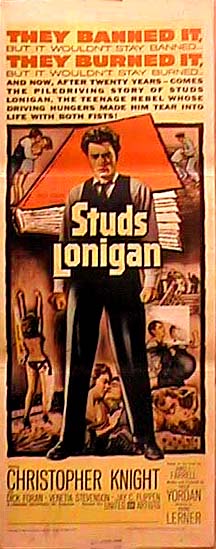
 |
Again, the book Studs Lonigan explores the concept of the movies within literature. Farrell describes a man who is interested with the world around him, yet he still doesn't really understand how to behave in such an environment. In other words, Studs is easily influenced by his environment, which pertains to his desire to want to fit into the crowd. As long as he tries to become like everybody else, Studs feels that he will be accepted by others. His easily-impressionable personality allows him to become a character with a static personality. Due to a lack of autonomy and concrete characteristics, Studs resorts to actions that simply further his absence of character. He fails to treat women properly and he tends to make decisions that will not necessarily better himself, but he performs activities to further his acceptance from others. All of these factors eventually lead Studs to an unemotional mess that is just achieving to feel something. When Studs attends the movies, however, he does so in order to divert himself from his everyday worries and concerns. He bargains for more than he originally intended, as he becomes rather involved with the movie; as a result, he is overwhelmed with emotion and goes as far as speaking to others with said emotion. For example, he even relinquishes his "macho" personality when he leans over to his friend Slug and whispers, "Christ, he's a mean-looking brute" (Farrell, 271). That is exactly what the movies can do to people. Film can transform people into a new atmosphere that is absent of those matters that plague the mind with stress. The early part of the twentieth century introduces cinema to the public; those willing to explore such an innovative new form of entertainment were greeted with great surprise. It provided heightened emotion in addition to an escape from the working class. The film industry was exactly what the people of Chicago were looking for during a time of woes, including the Depression and the endless bustle of the industrial movement. |